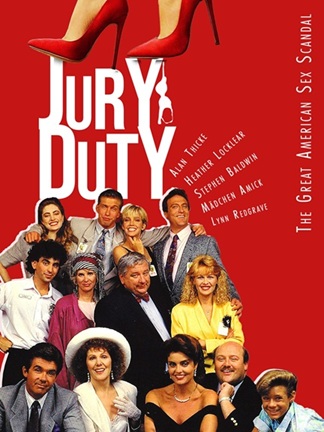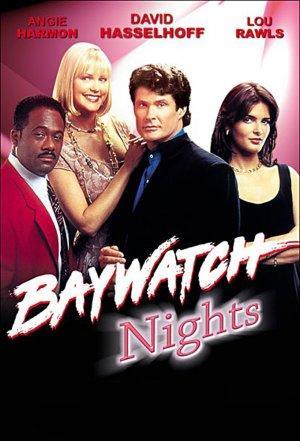 Meek-looking accountant Sanford Lagelfost (Bronson Pinchot) is on trial for embezzlement. It’s supposed to be a simple, up-and-shut case but when the beautiful star witness (Tracy Scoggins) testifies that Sanford is an amazing lover, it becomes a tabloid sensation and the jurors are sequestered in a hotel, where they have to deal with their own restlessness and several distractions, the majority of whom are also played by Bronson Pinchot. Pinchot plays a total of four characters but it’s not like he’s Peter Sellers or even Eddie Murphy. He looks and sounds like Bronson Pinchot in every role.
Meek-looking accountant Sanford Lagelfost (Bronson Pinchot) is on trial for embezzlement. It’s supposed to be a simple, up-and-shut case but when the beautiful star witness (Tracy Scoggins) testifies that Sanford is an amazing lover, it becomes a tabloid sensation and the jurors are sequestered in a hotel, where they have to deal with their own restlessness and several distractions, the majority of whom are also played by Bronson Pinchot. Pinchot plays a total of four characters but it’s not like he’s Peter Sellers or even Eddie Murphy. He looks and sounds like Bronson Pinchot in every role.
The jurors are played by a bunch of a familiar television actors. Alan Thicke plays a yuppie named Phil and Lynn Redgrave plays a hippie named Abby and they end up getting married. Stephen Baldwin is the waiter who falls for Heather Locklear, an actress who is a former call girl who is being threatened by her pimp. Madchen Amick is the spoiled rich girl. Television mainstays Mark Blankfield, Ilene Graf, William G. Schilling, Danny Pintauro, and Bill Kirchenbauer are all present and accounted for. Adding to the overall sitcom feel of the movie is the presence of Reginald VelJohnson as the judge. No one in the cast tries very hard, though I do think a case can be made that Madchen Amick was the most beautiful woman on television in 1990.
With the film failing to achieve either a consistent tone or a single laugh, the best thing that I can say about Jury Duty is that it didn’t feature Pauly Shore. Instead it featured Alan Thicke driving a BMW with a license plate that read, “BMW4Phil.” It’s hard to believe that this film was directed by Michael Schultz, who was responsible for movies like Car Wash, Cooley High, and Greased Lightning in the 70s and Berry Gordy’s The Last Dragon in the 80s.
I wish I had watched The Last Dragon instead.

